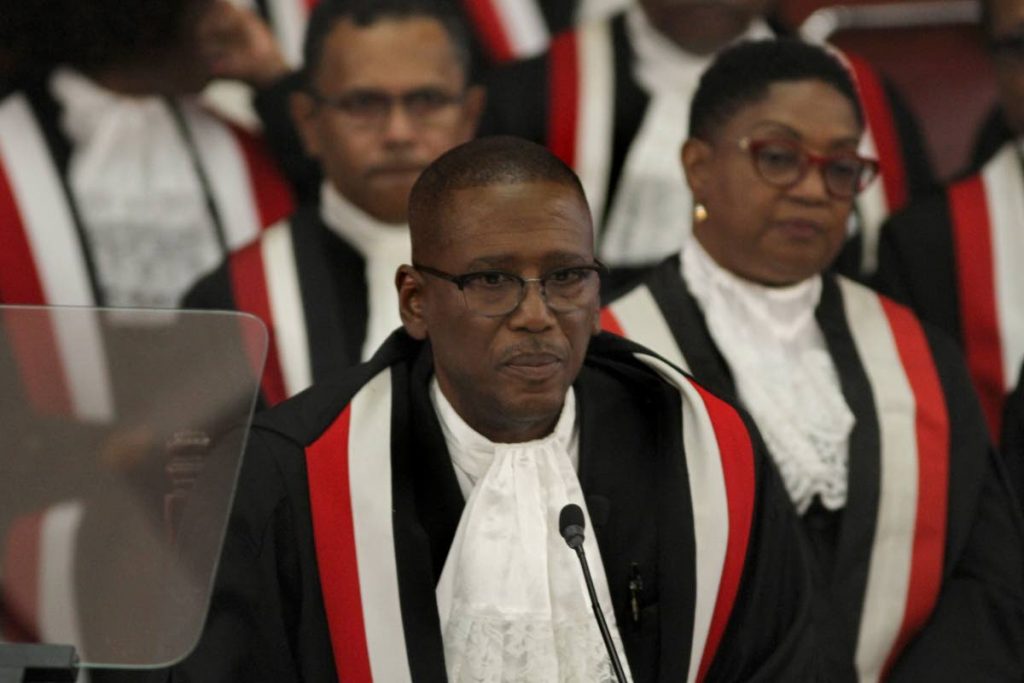LICKS FOR ALL

NO ONE was spared by Chief Justice Ivor Archie yesterday as he waded into numerous critics of his stewardship and the Judiciary which he has led for a little over a decade.
Archie, in his opening address for the ceremonial opening of the 2018/2019 law term at the Convocation Hall of the Hall of Justice, made it clear the Judiciary was neither in crisis mode nor was it in shambles. He also hit out at the focus on bacchanal rather than the work of the Judiciary.
As the longest serving Chief Justice – he was appointed in January 2008 – he said that alone presented challenges for some. And according to him, as Chief Justice, Archie was only accountable, after God and the Constitution, to the people of TT.
“But we all have to suck it up and do the job we are assigned to do.” He said he would continue to secure the independence of the Judiciary as a fundamental bulwark and the last bastion of independence and justice.
While in the past, he had only delivered one-line defences, yesterday he spoke frontally to his critics, which included the media, the legal fraternity and even judges. “Change can be scary, especially when we have to leave comfort zones and learn a new way of doing things,” he said, admitting that getting people to accept change was the hardest challenge of any leader.
“Much of the vitriol,” he said, came from people who had never managed anything big, were not management professionals, did not respect other professions and did not appear to comprehend evolving technologies. “Systems designed to strengthen the institution cannot be undermined, usurped or subjected to the influence of a few,” he said.
TRANSFER IS NOT DEMOTION
As he addressed the recent re-assignment of judges, Archie said he was dismayed by the perception that sending a judge to the Family Court implied demotion or loss of seniority.
“There is only one Supreme Court and judges may be assigned to any division, at the discretion of the Chief Justice, and in the best interest of the Judiciary,” Archie declared, adding only a special type of judge goes to the Family Court.
In scolding the media, he said the fourth estate appeared to have abandoned its “responsibility to educate and inform, or even to act responsibly at times” relying on, “uninformed” sources and making requests to the Judiciary based on inaccurate and impertinent issues.
“At the risk of being accused of arrogance, I am too busy doing the people’s work. Please don’t waste any of our time,” he told the media. Archie also said the media’s irresponsibility aided an “agenda” to break down institutions fundamental to the cohesiveness of society “to further personal and political ideologies.”
He also took aim at those in the legal profession who have spoken out against recent judicial appointments, despite their productivity levels leading to improvements in the system.
LAW ASSOCIATION TAKEN TO TASK
Archie also spoke of a willingness to work with the Law Association, but maintained the Judicial and Legal Services Commission (JLSC), of which he leads, will not delegate or abdicate its constitutional remit to it as it relates to judicial appointments.
On Friday, the association’s membership will meet to discuss a 2018 report it commissioned on judicial appointments, but Archie said the recent recruitment process for new judges to the High Court bench had to be aborted since no one met the requirements.
Archie said he saw no direct role for the association in the process, citing confidentiality issues. However, he said, as he quoted from the independent external examiner’s report, there was a lack of critical thinking, legal analysis and weak writing skills which pointed to the fact that many attorneys do not keep abreast of recent developments in law.
“Success or popularity at the bar is no guarantee of a successful transition to the bench,” Archie said, adding that “as goes the bar, so goes the bench.
He said the Judiciary’s Judicial Education Institute (JEI) stands committed and ready to support and partner with the association “once it rediscovers its statutory moorings” so that a better prepared pool of aspiring judges can be provided.

Archie said, whether temporary or permanent, judicial appointees have to hit ground running from day one as their work will affect the lives of families and property.
“This job is not about profiling in the media or storming big people party. Forgive me for speaking frankly when I say if you’re power or status driven, you can be as bright as you want, you’re not suitable.”
“I make no apologies for my approach. The most important people are not lawyers, or even judges, but the people whom we serve.”
DISDAIN IN SOCIETY
As he addressed “other people’s challenge,” he acknowledged there appeared to be a “malady” that has infiltrated the psyche of the country, which was a disdain for institutions of state and general and overt hostility towards the occupants of public office.
“Today we feel empowered to tear down our leaders and institutions they lead and even those we belong to. As stakeholders, we lose sight of the fact that in doing so we undermine our own legitimacy, weaken the society while eroding our own independence and sovereignty,” he said.
The Chief Justice said this type of behaviour produces an environment that breeds division, disunity, and self-loathing and perpetuates tribalism.
Speaking under the theme: Transformation for Enhanced Delivery, during the CJ’s address a video presentation highlighted some of the upcoming initiatives, including the new judicial information management system – an electronic court management system – Court Pay, eProbate and eBail.
He also spoke of new court buildings for Princes Town, San Fernando as well as Arima, in addition to a Family Court for south Trinidad. In July, family court attorneys questioned why a new Family Court was being rolled-out in Tobago while south Trinidad was left out.
Archie assured that once the Judiciary was given access to funding, it will be able to deliver the new courts on time and on budget as it has done with the judicial officers’ quarters in Tobago.
Other plans for the Judiciary include the move of civil courts to the Parliament Building at Tower D on the Waterfront, which is expected to happen during this law term.
The Hall of Justice will be reserved for criminal and appellate courts. Archie also spoke of the blame heaped on the Judiciary by those who felt it was to be faulted for inefficiencies in the criminal justice system because of delays in bringing cases to court or the sentences handed out by judges and magistrates.
“The Judiciary does not determine who and when to prosecute, what is deserving of a plea bargain or conduct forensic examinations. The inefficiencies in the outcomes in the criminal justice system are outside of the purview of the Judiciary,” he said, adding that he understood the other stakeholders also faced labour, financial and structural constraints. “This is a clarion call to deepen dialogue,” he said.


Comments
"LICKS FOR ALL"